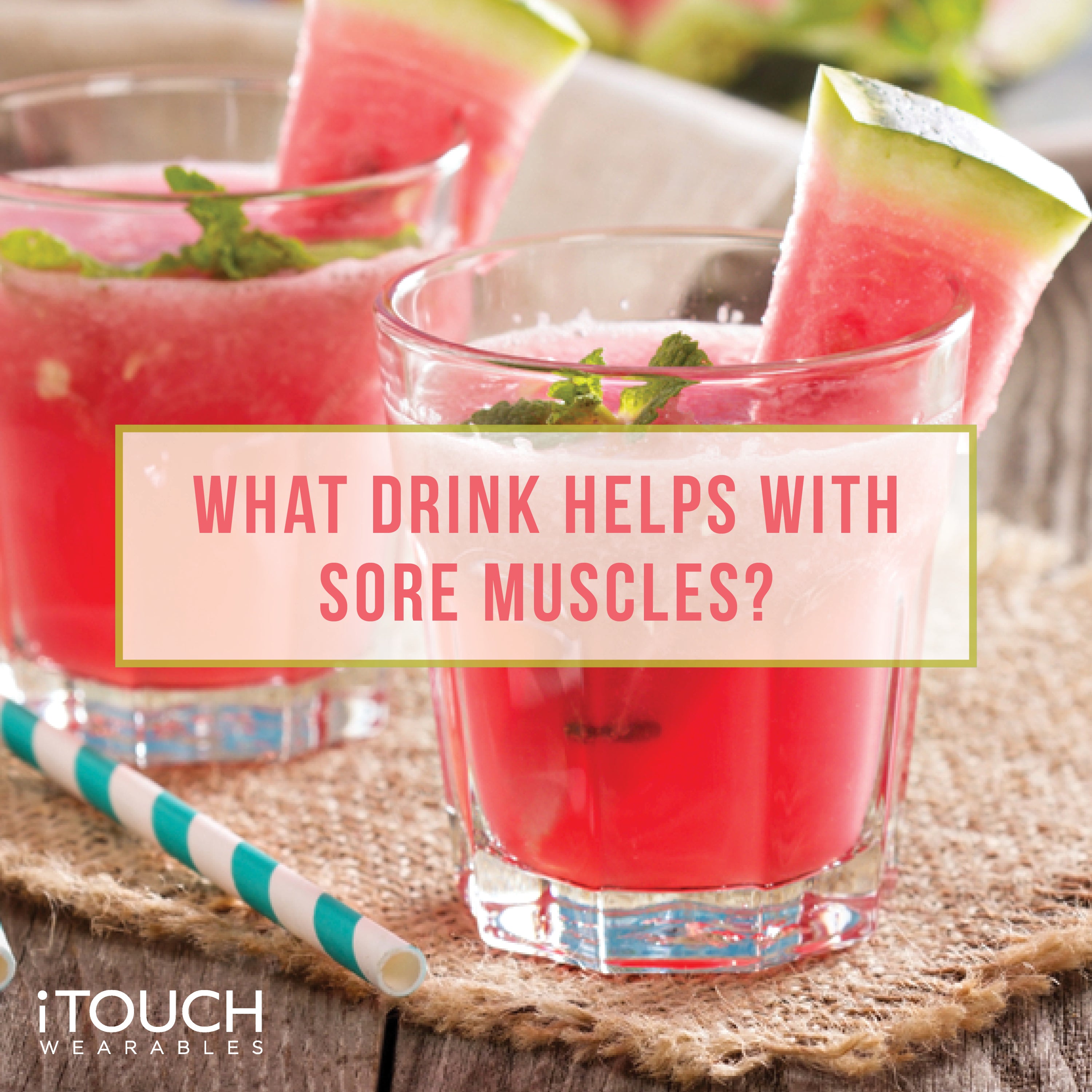
What Drink Helps With Sore Muscles?
When it comes to being a fitness guru or a casual workout fanatic, everyone knows that after your workout, nutrition is paramount and essential to be sure you get the most out of your routine. One way to replenish your electrolytes and be sure to stay hydrated is to make sure you are getting proper amount of water intake, which one amazing way to do so is by drinking watermelon juice. Watermelon’s stock has shot up in recent years, likely thanks to the likes of Beyonce and other celebrity endorsements. Pink cocktails aside, people are seamlessly showing the delicious juice as a smart choice pre- or post-workout thanks to its replenishing electrolytes and muscle-boosting amino acids and other nutrients. Some even go as far as saying that it’s the perfect recovery drink. We looked into it: Should you drink watermelon juice after a workout? Or, what drinks help with sore muscles or post-workout recovery?
The Nutritional Value of Watermelon

When it comes to watermelon, they are packed with water and nutrients making it exceptionally refreshing for an after workout refreshment. Watermelon is also extremely low in calories, it makes an incredible source of both citrulline and lycopene, which are two power plant compounds that are beneficial for a healthy heart and mind. The fruit also makes for a great natural remedy for lowering blood sugar levels, improving insulin sensitivity, and reducing muscle soreness. When it comes to the nutritional value of watermelon, this is what we found:
Watermelon consists primarily of water (91%) and carbs (7.5%), with almost little to no protein or fat. The nutrients in 2/3 cup (100 grams) of raw watermelon are
- Calories: 30
- Water: 91%
- Protein: 0.6 grams
- Carbs: 7.6 grams
- Sugar: 6.2 grams
- Fiber: 0.4 grams
- Fat: 0.2 grams
What makes watermelon juice one of the best recovery drinks for sore muscles is because of its high natural sugar content and the naturally found citrulline and lycopene found within raw watermelon. This drink for sore muscles usually contains about 12 grams of carbs per cup, which is mostly made up of naturally occurring simple sugars, such as glucose, fructose, and sucrose. While the sugar levels are high in watermelon, the carb content help to prevent your blood sugar levels from spiking, while providing you the energy you need for recovery.
Watermelon and watermelon juice are also full of vitamins and other nutrients essential to out bodies. Within watermelon, you will find :
- Vitamin C: Which is important for healthier skin and immune factors
- Vitamin B5: Also known as pantothenic acid
- Vitamin A: Watermelon contains beta carotene, which your body can turn into Vitamin A
- Potassium: This mineral is critical for heart health and blood pressure control
- Copper: Which can promote red blood cell growth
Citrulline and Watermelon Juice

It was found in a 2013 study published in the Journal of Agricultural and Food Chemistry that athletes who consumed about 2 cups of watermelon juice had reported less muscle soreness after a workout. Really, it is one of the best recovery drinks for sore muscles. The results came from the essential amino acids found within the watermelon. The citrulline within watermelon is a naturally occurring amino acid that contains many antioxidant properties.
One of citrulline's main functions within the body is to contribute to nitric oxide synthesis, which acts as a potent and stronger vasodilator, or blood vessel widener, that can help in increasing blood and oxygen flow to our tissues. When the blood and oxygen flow to our bodies are at higher levels, we are able to exercise at much higher intensity and intervals. The increased oxygen delivery also caused by the naturally occurring citrulline helps to enable faster muscle repair and recovery, which is assumed to be perceived result found within the study.
In the body, citrulline is also transformed into the essential amino acid known as arginine. Arginine is important for many of our body's organs, such as the lungs, kidney, and liver, as well as our reproductive and immune systems. It is also found that arginine is an important tool to aid in wound healing.
How To Make Watermelon Juice

When it comes to watermelon juice and this drink for sore muscles, many bottled commercial products are highly processed or pasteurized, which affects the growth and bioavailability of citrulline within the juice. If you purchase or plan to purchase watermelon juice, be sure to check that it is cold pressed or unpasteurized. You can also make your own watermelon juice at home (recipes provided!) which you do not need a juicer for. You can simply just cube your one watermelon and add it to a blender. You can also thin out the watermelon juice with needed with coconut water or even iced green tea for an extra boast on antioxidants and potassium. To make your own watermelon juice, here is how:
Basic Watermelon Juice Recipe
To make a simple watermelon juice to surely help soothe muscle soreness, without any additional flavoring, do as follows:
Serves : About 5 Cups | Yield Will Depend On Size of Watermelon
Gather Together :
- 1 Small Sweet Watermelon - About Six Pounds
- 1 Small Lime - Juiced (For Preserving | Optional)
Directions :
- Slice the watermelon in half. Using a big spoon, scoop chunks of sweet watermelon into the blender. Discard the rind.
- Blend the watermelon until it is totally pulverized. This shouldn’t take more than a minute. For extra flavor, squeeze the juice of one small lime into the blender and blend for a few seconds.
- If your watermelon is notably pulpy or seeded, pour the mixture through a fine mesh strainer into a pitcher. If not, you can pour it directly into glasses filled with ice. Watermelon juice will keep in the refrigerator, covered, for up to 4 days. The juice will separate over time; stir it with a spoon to recombine.
Cucumber Apple Watermelon Juice
For a little added flavoring, this watermelon juice adds in some extra sweetness from apples and strawberries blended in with the refreshing qualities of cucumber.
Serves 12 Ounces
Gather Together :
- 2 Cups of Seedless Watermelon - Diced (Approximately 1/4th of a Medium-Size Watermelon)
- 3/4 Cup of Strawberries - Hulled and Diced
- 1 Cup of Apple - Cored and Diced - (Approximately 1 Medium-Size Apple | Such As Gala or Granny Smith)
- 1/2 Cup of Cucumber - Peeled, Cored, and Diced
- 1 Tablespoon of Filtered Water
- 1 Teaspoon of Lime Juice
Directions :
- Combine all of the ingredients in a blender and blend on high until a smooth, liquid-like texture is achieved. Grab a large bowl or measuring cup then place a fine mesh strainer over top. Slowly pour a quarter of the mixture into the strainer and press with a spatula so that juice begins to drain. Continue this step until the rest of the mixture has been added to the strainer and pressed. Allow the pulp to sit for at least 10 minutes to get any extra juice out.
- Refrigerate for at least 30 minutes (or freeze for 10) before serving.
When choosing a post-workout drink or refreshment, ditch those sugary energy drinks and go for watermelon juice. You'll see how this drink will surely help to alleviate sore muscles and make you instantly feel better and healthier!
Share with us whether or not you'll ever watermelon juice after your workout by tagging us on Instagram @itouchwearables and Facebook @itouchwearables. Also, be sure to check out our new articles published daily!
-Patrick


